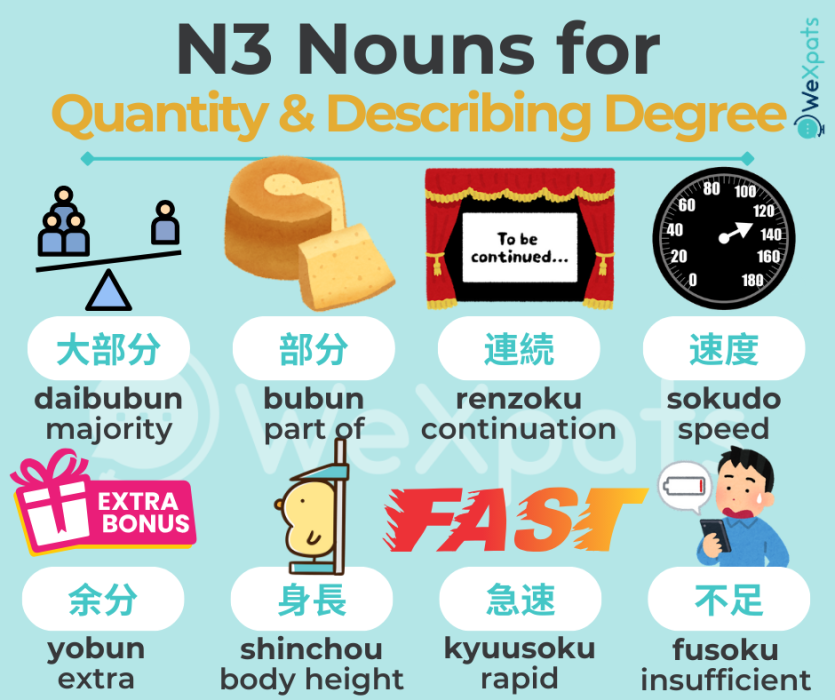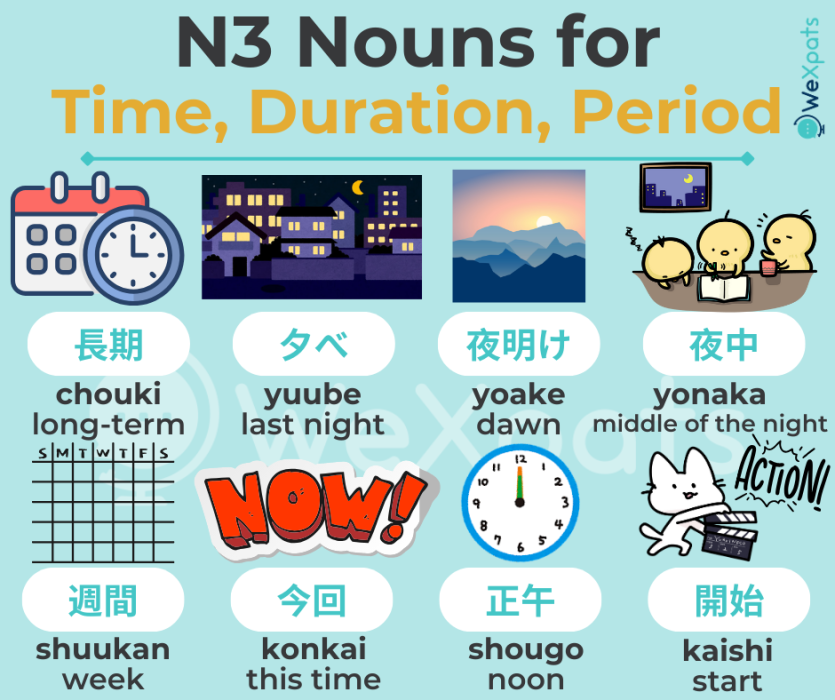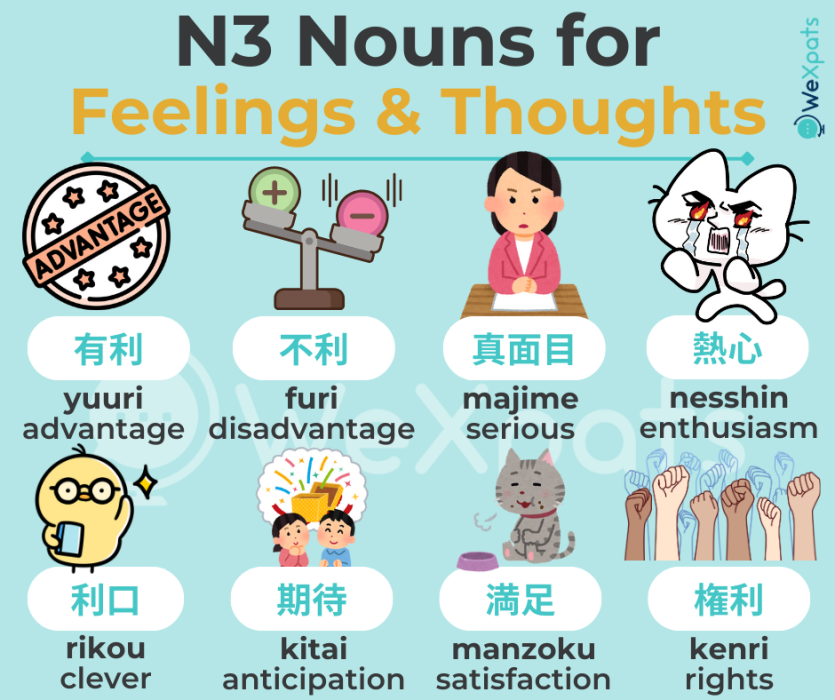In N3 Nouns List Part 3, we will learn Japanese nouns in 3 categories - “Time, Duration and Period”, “Quantity and Describing Degree”, “Others (Feelings, Thoughts, etc.)”.
Continuing from N3 Nouns List Part 2, there are 56 nouns at the N3 level to learn in this part. Let’s remember the usage and meaning of each of them.
And, as the last part to N3 Nouns List, challenge the example questions at the end to check your understanding.
Table of Contents
- N3 Lesson - Suffix for Japanese Nouns
- N3 Nouns List - Quantity and Describing Degree
- N3 Nouns List - Time, Duration and Period
- N3 Nouns List - Others (Feelings, Thoughts, etc.)
- Challenge the N3 Nouns Quiz!
N3 Lesson - Suffix for Japanese Nouns
The meaning of Japanese nouns change when the suffixes 的 (Teki) and 化 (Ka) is added. Additionally, part of speech can also be changed by adding suffixes. 的 (Teki) and 化 (Ka) are often used in written expressions so remember how they are used.
Noun + 的 (Teki)
By adding the suffix 的 (Teki) to a noun, the meaning, characteristic, or quality that the noun represents is emphasized. Examples:
- 計画的 (Keikakuteki) - planned; scheduled; systematic
- 一般的 (Ippanteki) - general; popular; common; typical
- 個人的 (Kojinteki) - personally; individually; privately
- 魅力的 (Miryokuteki) - charming; fascinating; attractive
- 協力的 (Kyouryokuteki) - cooperative; helpful
Noun + 化 (Ka)
By adding the suffix 化 (Ka) to a noun, the meaning of the noun can be used to change a situation or nature. It can also be expressed as a verb with “化 (Ka) + する (Suru)”. Examples:
- 国際化 (Kokusaika) - internationalisation
- 高齢化 (Koureika) - population ageing
- 少子化 (Shoushika) - declining birth rates
- 一体化 (Ittaika) - unification; integration
- デジタル化 (Dejitaruka) - digitization
Example Sentences:
-
国際化が進み、英語を学ぶ人が増えた。
(Kokusaika ga susumi, eigo wo manabu hito ga fueta.)
- As internationalization progresses, the number of people learning English has increased. -
IT技術によりデジタル化したものも多い。
(IT gijutsu niyori dejitarukashita mono mo ooi.)
- Many things have been digitized through IT technology.
Writer's Pick
N3 Nouns List - Quantity and Describing Degree
Since many Quantity and Describing Degree-related words can have ambiguous meanings, it is important to first understand the correct meaning of the words.

Example Sentences Using N3 “Quantity and Describing Degree” Nouns
1. 参加者の大部分 (Daibubun)は外国人でした。
(Sankasha no daibubun wa gaikokujin deshita.)
- Majority of the participants were foreign nationals.
2. この果物の実の部分 (Bubun)はどこですか。
(Kono kudamono no mi no bubun wa doko desuka)
- Where is the seed part of this fruit?
3. 1週間連続 (Renzoku)で晴れている。
(Isshukan renzoku de hareteiru.)
- The weather has been clear for a week straight.
4. 速度 (Sokudo)を守って運転しましょう。
(Sokudo wo mamotte untenshimashou.)
- Please keep to the speed limit when driving.
5. 友達の分まで余分 (Yobun)に傘を準備した。
(Tomodachi no bun made yobun ni kasa wo junbishita.)
- I prepared extra umbrellas for my friends.
6. 彼は学年で一番身長 (Shinchou)が高いです。
(Kare wa gakunen de ichiban shinchou ga takai desu.)
- He is the tallest in his grade.
7. ウイルスの感染が急速 (Kyuusoku)に広がった。
(Uirusu no kansen ga kyuusoku ni hirogatta.)
- The virus infection spreads rapidly.
8. 不足 (Fusoku)分の料金を現金で払う。
(Fusoku bun no ryoukin wo genkin de harau.)
- I will pay the amount short by cash.
N3 “Quantity and Describing Degree” Nouns List
Note: Pay particular attention to remembering Kanji in BOLD.
|
ぶぶん |
部分 |
portion; section; part |
|
ぶん |
分 |
part; segment; share; ration |
|
だいぶぶん |
大部分 |
most part; greater part; majority |
|
ちゅう |
中 |
during; while; medium; middle |
|
えん |
円 |
yen; Japanese monetary unit; circle |
|
ふそく |
不足 |
insufficiency; shortage; deficiency; |
|
いっち |
一致 |
agreement; union; match; coincidence |
|
いっそう |
一層 |
much more; still more; all the more; |
|
いったい |
一体 |
(what) the heck; (why) in the world |
|
いっしゅ |
一種 |
species; kind; variety |
|
きょうりょく |
強力 |
powerful; strong |
|
きゅうそく |
急速 |
rapid (e.g. progress) |
|
まんいち |
万一 |
emergency; unlikely event; by some chance; |
|
なかば |
半ば |
middle; half; semi; halfway; partly |
|
れんぞく |
連続 |
continuation; succession; series |
|
しょうしょう |
少々 |
just a minute; small quantity |
|
そくど |
速度 |
speed; velocity; pace; rate |
|
たいはん |
大半 |
majority; more than half; most; |
|
たしょう |
多少 |
more or less; somewhat; a little; |
|
よぶん |
余分 |
extra; excess; surplus |
|
ゆいいつ |
唯一 |
only; sole; unique |
|
まっ |
真っ〇 |
deep shade (of colour); |
|
しんちょう |
身長 |
body height; stature |
N3 Nouns List - Time, Duration and Period

“Noun + Noun”, by adding a noun before a noun, you can create a new noun with a different meaning. Examples:
-
“開始 (Kaishi) - start” + “時間 (Jikan) - time” = 開始時間 (Kaishi Jikan) - starting time
Example Sentence : コンサートの開始時間は9時です。
(Konsa-to no kaishi jikan wa kuji desu.)
- The concert’s starting time is at 9 o’clock. -
“一時 (Ichiji) - one time; once” + “帰国 (Kikoku) - return to one’s country” = 一時帰国 (Ichiji Kikoku) - temporary return to one’s country
Example Sentence: 彼は一時帰国のため母国へ戻った。
(Kare wa ichiji kikoku no tame bokoku he modotta.)
- He returned to his home country for a temporary visit. -
“週間 (Shuukan) - week” + “天気予報 (Tenki Yohou) - weather forecast” = 週間天気予報 (Shuukan Tenki Yohou) - weekly weather forecast
Example Sentence: テレビで週間天気予報を確認した。
(Terebi de shuukan tenki yohou wo kakuninshita.)
- I checked the weekly weather forecast on television.
Example Sentences Using N3 “Time, Duration and Period” Nouns
1. 彼は長期 (Chouki)休暇を使って海外旅行へ行った。
(Kare wa chouki kyuuka wo tsukatte kaigai ryokou he itta.)
- He used his extended leave to travel abroad.
2. 夕べ (Yuube)は暑くて眠れなかった。
(Yuube wa atsukute nemurenakatta.)
- It was so hot last night I could not sleep.
3. 作業は夜明け (Yoake)まで続いた。
(Sagyou wa yoake made tsuzuita.)
- Work continued until dawn.
4. 夜中 (Yonaka)に目が覚めてトイレに行った。
(Yonaka ni me ga samete toire ni itta.)
- I woke up in the middle of the night and went to the toilet.
5. 日本に来て1週間 (Shuukan)が過ぎた。
(Nihon ni kite isshukan ga sugita.)
- 1 week has passed since I came to Japan.
6. 試合で勝ったのは今回 (Konkai)が初めてです。
(Shiai de katta nowa konkai ga hajimete desu.)
- This is the first time I won a match.
7. 正午 (Shougo)から昼休みが始まる。
(Shougo kara hiruyasumi ga hajimaru.)
- Lunch break starts at noon.
8. 試合開始 (Kaishi)は10時です。
(Shiai kaishi wa jyuuji desu.)
- The match starts at 10 o’clock.
N3 “Time, Duration and Period” Nouns List
Note: Pay particular attention to remembering Kanji in BOLD.
|
ちょうき |
長期 |
long-term |
|
いちじ |
一時 |
one o’clock; temporary; once |
|
いっしゅん |
一瞬 |
instant; moment; for an instant |
|
かいし |
開始 |
start; commencement; beginning; initiation |
|
こんご |
今後 |
from now on; hereafter |
|
こんかい |
今回 |
now; this time; lately |
|
おひる |
お昼 |
lunch; midday; daytime |
|
しょうご |
正午 |
midday; noon |
|
しゅう |
週 |
week |
|
しゅうかん |
週間 |
week |
|
しゅうかん |
週刊 |
weekly publication |
|
よあけ |
夜明け |
dawn; daybreak |
|
よなか |
夜中 |
middle of the night; dead of night |
|
ゆうべ |
夕べ |
evening; last night; last evening |
|
ちゅうしょく |
昼食 |
lunch; midday meal |
N3 Nouns List - Others (Feelings, Thoughts, etc.)
Nouns that express feelings and thoughts are used to convey one’s emotions, a situation, or one’s position to others. They are useful for daily life communication so remember them well.
Also, keep in mind that nouns to express personalities and qualities are often turned into adjectives by adding “Noun + な (Na) / に (Ni) / だ(Da)”.

Example Sentences Using N3 “Others (Feelings, Thoughts, etc.)” Nouns
1. 今回の試合では彼女が有利 (Yuuri)だった。
(Konkai no shiai dewa kanojo ga yuuridatta)
- She had an advantage in this match.
2. たとえ不利 (Furi)な状況でも最後まで諦めない。
(Tatoe furina jyoukyou demo saigo made akiramenai.)
- Even if the situation is unfavourable, never give up till the end.
3. 弟は真面目 (Majime)な性格です。
(Otouto wa majimena seikaku desu.)
- My younger brother has a serious personality.
4. 先生は最後まで熱心 (Nesshin)に教えてくれた。
(Sensei wa saigo made nesshin ni oshietekureta.)
- The teacher taught with great enthusiasm until the end.
5. 彼女の犬はとても利口 (Rikou)だ。
(Kanojo no inu wa totemo rikouda.)
- Her dog is very clever.
6. 家族の期待 (Kitai)にこたえられるよう頑張りたい。
(Kazoku no kitai ni kotaerareruyouni ganbaritai.)
- I want to do my best to meet my family’s expectations.
7. 皆と楽しい時間を過ごせてとても満足 (Manzoku)した。
(Minna to tanoshii jikan wo sugose totemo manzokushita.)
- I was very satisfied with the good time I had with everyone.
8. 国民の権利 (Kenri)を主張した。
(Kokumin no kenri wo shuchoushita.)
- He/She/I advocated for the citizen’s rights.
N3 “Others (Feelings, Thoughts, etc.)” Nouns List
Note: Pay particular attention to remembering Kanji in BOLD.
|
あらた |
新た |
new; fresh; novel |
|
だめ |
駄目 |
no good; cannot |
|
ふり |
不利 |
disadvantage; handicap; unfavourable |
|
ひとこと |
一言 |
single word; a few words; brief comment |
|
じゃま |
邪魔 |
hindrance |
|
けんり |
権利 |
right; privilege |
|
きみ |
気味 |
sensation; feeling; tendency |
|
きおく |
記憶 |
memory; recollection; remembrance |
|
きたい |
期待 |
expectation; anticipation; hope |
|
まんぞく |
満足 |
satisfaction; contentment; sufficient; |
|
みりょく |
魅力 |
charm; fascination; glamour; |
|
ねっしん |
熱心 |
enthusiastic; eager |
|
しげき |
刺激 |
stimulus; impetus; incentive; |
|
しゅうちゅう |
集中 |
concentration; focus; centralization; integration |
|
ゆうり |
有利 |
advantageous; favourable; profitable |
|
あくま |
悪魔 |
devil; demon; fiend; Satan |
|
いっぱん |
一般 |
general; universal; ordinary; average; |
|
りこう |
利口 |
clever; intelligent; wise; bright; sharp |
|
まじめ |
真面目 |
serious; earnest |
Challenge the N3 Nouns Quiz!
At the JLPT N3 level, there are many questions on nouns that ask students what the Kanji reading is, or to choose the correct noun to complete the sentence. At the N3 level, there are many questions written in Kanji, so be sure to understand their meaning and know their reading.
Let’s try answering these JLPT N3 Nouns example questions.
例題1:( )のことばの読み方として最もよいものを1・2・3・4から一つえらびなさい。
①あきらめずに(努力)を続けることが大切だ。
1.ろりょく 2.どりき 3.どりょく 4.ろうりょく
②親は子どもの(成長)を楽しみにしている。
1.せいか 2.せいちょう 3.せいなが 4.せちょう
例題2:( )のことばを漢字で書くとき、最もよいものを1.2.3.4から一つえらびなさい。
①父は(ねっしん)にサッカーを教えてくれた。
1.熱新 2.熱親 3.熱心 4.熱芯
②私は彼の変化に(きたい)している。
1.期待 2.希待 3.期体 4.気体
例題3:( )に入れるのに最もよいものを、1.2.3.4から一つえらびなさい。
①アンケート用紙に( )してください。
1.証明 2.記入 3.分析 4.学習
②彼は運動( )が高く、多くの大会に出場している。
1.協力 2.魅力 3.能力 4.気力
【Quiz Translation and Answers】
Check how you did in the quiz!
例題1:( )のことばの読み方として最もよいものを1・2・3・4から一つえらびなさい。
(Reidai Ichi : ( )no kotoba no yomikata toshite motomo yoi mono wo 1・2・3・4 kara hitotsu erabinasai.)
- Example Question 1 : Select the correct reading among 1・2・3・4 for the word in ( ).
① あきらめずに(努力 - 3. どりょく)を続けることが大切だ。
(Akiramezuni (3. Doryoku)wo tsuzukeru koto ga taisetsuda. )
- It is important to keep trying without giving up.
②親は子どもの(成長 - 2. せいちょう)を楽しみにしている。
(Oya wa kodomo no (2. Seichou)wo tanoshiminishiteiru.)
- Parents look forward to their children’s growth.
例題2:( )のことばを漢字で書くとき、最もよいものを 1・2・3・4から一つえらびなさい。
(Reidai Ni : ( )no kotoba wo kanji de kaku toki, motomo yoi mono wo 1・2・3・4 kara hitotsu erabinasai.)
- Example Question 2 : Select the correct answer among 1・2・3・4 for the word in ( ) when written in Kanji.
①父は(3. 熱心)にサッカーを教えてくれた。
(Chichi wa nesshin ni sakka- wo oshietekureta.)
- My father enthusiastically taught me soccer.
②私は彼の変化に(1. 期待)している。
(Watashi wa kare no henka ni kitaishiteiru.)
- I anticipate a change in him.
例題3:( )に入れるのに最もよいものを、1.2.3.4から一つえらびなさい。
(Reidai San: ( )ni ireru noni motomo yoi mono wo, 1・2・3・4 kara hitotsu erabinasai.)
- Example Question 3 : Select the most suitable answer from 1・2・3・4 to fill in ( ).
①アンケート用紙に(2. 記入)してください。
(Anke-to youshi ni kinyuushitekudasai.)
- Please fill in the questionnaire form.
②彼は運動(3. 能力)が高く、多くの大会に出場している。
(Kare wa undou nouryoku ga takaku, ooku no taikai ni shutsujyoushiteiru.)
- He has high athletic abilities and has participated in many tournaments.
Quiz Answers:
(1) [3], [2]
(2) [3], [1]
(3) [2], [3]

































